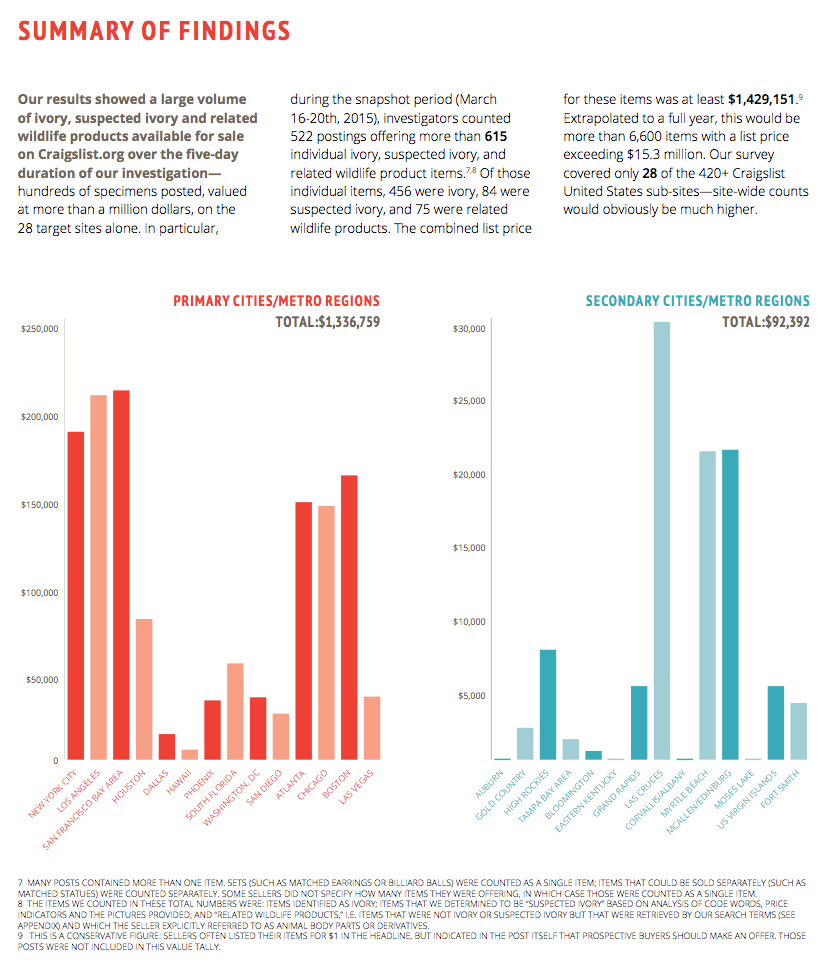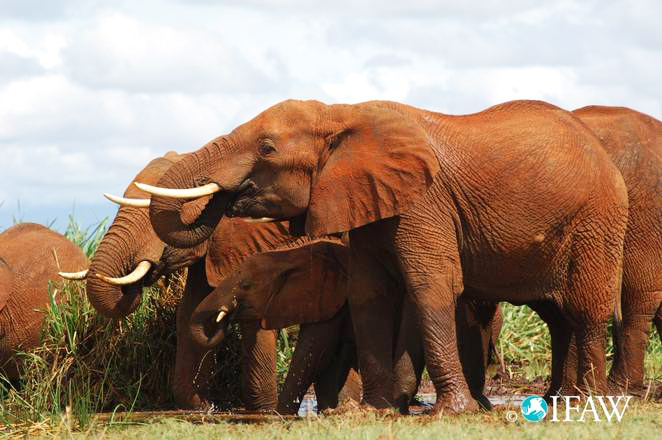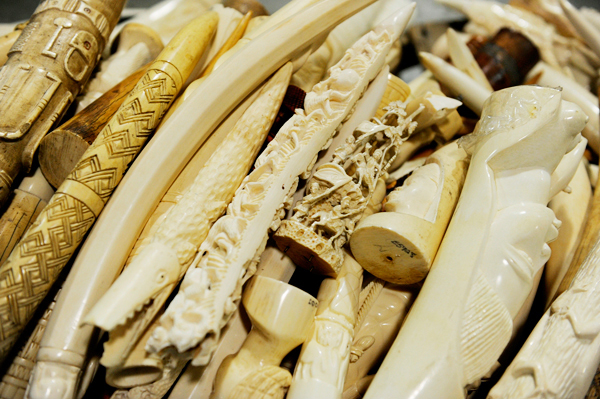A Different Kind Of Craigslist Killer
IFAW and WCS uncover another multi-million dollar link in the thriving online ivory market… and work to fix it.
By Vicki Croke
“The ivory trade on Craigslist is alive and well.”
So says Peter LaFontaine, of the International Fund for Animal Welfare. Yesterday, IFAW as well as the Wildlife Conservation Society released the results of an in-depth investigation into the sale of ivory and other related wildlife products through Craigslist, the giant classified ad website.
LaFontaine writes on his blog:
The investigation, which collected data from 28 Craigslist’s city-sites between March 16–20, found many instances of ivory products being sold. Investigators tracked 522 postings offering more than 600 items, for a combined asking price of nearly $1.5 million. Extrapolated to a full year, this would yield over 6,600 items with a list price exceeding $15 million. And it wasn’t just ivory – we discovered ottomans made of elephant feet, African warthog tusks, elephant-leather boots – and most of it was offered on a no-questions-asked basis.
So, does that mean that new ivory from just-slaughtered elephants is being sold here?
LaFontaine writes:
Antique?
Just smuggled in?
Who knows?
From these results, it is clear that the ivory trade on Craigslist is alive and well. It also exemplifies how hard it is to police wildlife trade in the age of the Internet. Simply put, our laws have too many loopholes, especially when it comes to online commerce.
Shutting down the online market in smuggled wildlife goods is ongoing process.

A summary of findings from “Elephant vs Mouse: An Online Investigation of the Ivory Trade on Craigslist.” Courtesy of IFAW and WCS.
According to the British newspaper The Guardian:
Illegal online trafficking in imperiled wildlife is rampant, and attempted controls are few and largely ineffective. Log on to most any international internet store that deals in wildlife or wildlife parts, and you’ll find a charnel house of endangered and protected species hawked openly or under phony names and in violation of US law and international agreements.
The world’s largest online marketplace by far, eBay, is one of the few that makes a serious effort to control wildlife smuggling by deleting ads for illegal products — but only the few it notices or hears about.
Both IFAW and WCS have been working with other large online markets, such as eBay.
IFAW reports:
We’ve detailed these issues in several past investigations. In 2008, IFAW released “Killing with Keystrokes,” an investigation of the illegal wildlife trade on the web. In turn, eBay announced that it would no longer allow the sale of ivory on its platform, and has worked with IFAW since then to ensure its search filters maintain strong controls on wildlife trade. In 2014, IFAW conducted its “Wanted Dead or Alive: Exposing the Online Wildlife Trade” report, which showed that eBay’s ivory ban has been largely successful.
Craigslist already has a policy prohibiting the sale of animal parts, though you wouldn’t know it unless you dig deep into their back pages.
So the problem has been uncovered. What’s being done to fix it?
IFAW says:
During the course of our investigation, we reached out to the company to ask for their help, and CEO Jim Buckmaster responded with a great first step: as of last week, the website has added ivory to its “Prohibited Items” list. Unfortunately, too many people can simply ignore the guidelines and get away with selling ivory and other wildlife products.
We know that ivory trade anywhere is a threat to elephants everywhere, which is why we want to join with Craigslist to publicize and enforce this good policy.
Our hope is that the company will follow in the footsteps of eBay, Etsy.com, and other online marketplaces that have willingly cooperated with law enforcement and conservation NGOs to reduce wildlife crimes on their platforms, particularly by using software to identify and remove postings for ivory. We will continue to work to ensure these online marketplaces aren’t helping to drive the slaughter of imperiled species, because Craigslist should be a great place to buy a bike, not a dead elephant.
WCS has also looked to television for ways to stop the sale of ivory. According to that organization:
WCS and 96 Elephants targeted Antiques Roadshow last year with a successful campaign that led to the popular PBS Program to agree to stop appraising ivory tusks on the air and to educate viewers about the ivory trade.
And elephants are clearly dying in enormous numbers.
According to Mongabay:
Recently experts estimated that 20,000 elephants were killed last year for their ivory, a number unchanged from the year before. The U.S. is generally considered the second largest market in the world for ivory after China. Last year, the Obama Administration closed legal loopholes in federal ivory laws and pledged to increase efforts to crackdown on the domestic trade through various agencies.
African elephants are currently listed as Vulnerable by the IUCN Red List, but the listing hasn’t been updated since 2008—right after the recent spate of elephant killings took off. Moreover, the listing doesn’t separate savannah elephants and forest elephants despite research arguing that these pachyderms are distinct species.


